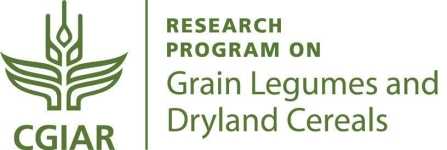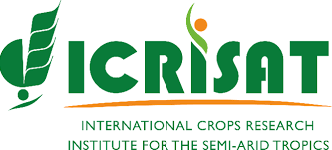More than 4,000 smallholder farmers empowered through crop variety technology delivery and trainings via Farmers Producers Organizations in Andhra Pradesh, India
Published on: April 6, 2021, Submitted by Jake Carampatana on: March 16, 2021, Reporting year: 2020
The initiative has trained 4135 farmers including 606 women farmers on ICRISAT`s mandate crops in the semi-arid drought prone districts of Andhra Pradesh state. Field demonstrations were witnessed by 580 farmers in Groundnut (ICGV 91114) and Pigeonpea (ICPP 14003) in 145 acres. In 2020 post-rainy season, estimated 300 acres in 4 villages were cultivated with ICGV 91114 by FPO members from initially an acre of demo-seed production setup coupled with soil health card recommendations adoption.
Dr. Hary conducting a post-harvest training inMay 2018, Andhra Pradesh.
Groundnut is an important crop largely cultivating in Anantapur district, Andhra Pradesh State. However, many farmers in this district are growing groundnut varieties introduced more than 30-40 years back, namely Kadiri-6, TAG-24 and Dharani which is worsened by low quality seed accessibility. The government has identified Farmer Producer Organizations (FPOs) made up of only practicing farmers who are also actual producers of specified commodities and is formed under the Mutually Aided Cooperative Societies (MACS) Act 1995 or as a Farmers Producer Company (FPC) under the Companies Act 2013. In this direction, Society for Elimination of Rural Poverty (SERP) identified poverty clusters located through an area approach and institutionalized commodity based FPOs as a vehicle to harness the collective capacity of farmer groups for enhancing yields and profitability of producers. ICRISAT partnered with SERP in their Andhra Pradesh Rural Inclusive Growth Project (APRIGP) to enhance productivity of farmers through the transfer of technology. A critical gap identified at the field level was non-availability of improved seed varieties for smallholder groundnut farmers. An on-farm demonstration of groundnut variety ICGV 91114 from ICRISAT, a Spanish variety with short-duration (95-100 days) and tolerant to intermittent and terminal droughts was strategically introduced in four FPOs based in Gooty, Singanamala, Nallamada and Kambadur as identified by SERP staff. This variety has been released in Andhra Pradesh, Odisha, Karnataka and Gujarat states. The salient features of this variety includes 52 % oil content, 17 % protein content, shelling percentage of nearly 70 % with a 100 seed weight of about 41g and potential pod yield of about 2 t/ha, with good fodder quality. One model case involves a randomly selected farmer, Mr. Boya Narsimhulu of Singanamala FPO who agreed to an on-farm demonstration of introducing ICGV 91114. From an acre crop in one season, three other farmers benefited from the purchase of seed from Narsimhulu resulting in cultivation in 8 more acres. In 2019-2020 post-rainy season, an estimated 300 acres were taken up within the vicinity of 3-4 villages. This comprises approximately 15 % of sown area of groundnut in these villages where the improved variety ICGV 91114 has successfully replaced the old variety (K6). The impact of this on-farm demonstration of improved variety of groundnut shows that farmer not only improved their cultivation practices by following soil health card recommendations but also adopted improved groundnut variety that gave them more profits despite drought.
More than 4135 farmers belonging to 162 Farmer Producer Organisations (FPOs) in the state of Andhra Pradesh, India, were trained in the use of tools that facilitated advisories and market linkages, including other value chain players. Each farmer attended a one day training program on package of practices, plant protection and postharvest management. Field demonstrations were also carried out, witnessed by 580 farmers, about groundnut (ICGV 91114) and pigeonpea (ICPP 14003) management in 145 acres. The training feedback from the participants were most valuable and will increase the efficacy of future training programs.
The results from the field demonstrations have shown that introducing improved varieties of groundnut and pigeonpea yielded a 28% increase in productivity when compared to other farmers' practices. To further increase such yield, the activity has also introduced postharvest storage bags (PICS) to reduce postharvest losses in 120 groundnut farms.
Groundnut and pigeonpea are legumes that contribute to a balanced and healthy diet providing much needed proteins. For this reason, by increasing the crops productivity and reducing their postharvest losses directly increases on the nutritional levels of the local population, with a chain effect of positive outcomes on their livelihoods.
Stage of Maturity and Sphere of influence
-
Stage of Maturity: Stage 2
-
Contributions in sphere of influence:
3.3.1 - Increased resilience of agro-ecosystems and communities, especially those including smallholders
D.1.4 - Increased capacity for innovation in partner development organizations and in poor and vulnerable communities
Acknowledgement
The outcome of this activity have been obtained through the synergy of the Farmers Producers Organizations (FPOs) of Andhra Pradesh, the Society for the Elimination of Rural Poverty (SERP), the Government of Andhra Pradesh, the International Crops Research Institute for the Semi-Arid Tropics (ICRISAT), in the framework of the CGIAR Research Program on Grain Legumes and Dryland Cereals (GLDC).
Projects
-
Selection of an Agency for Capacity Building and Market Linkages for Empowerment of Farmer Producer Organizations in Andhra Pradesh thru Digital Networks






